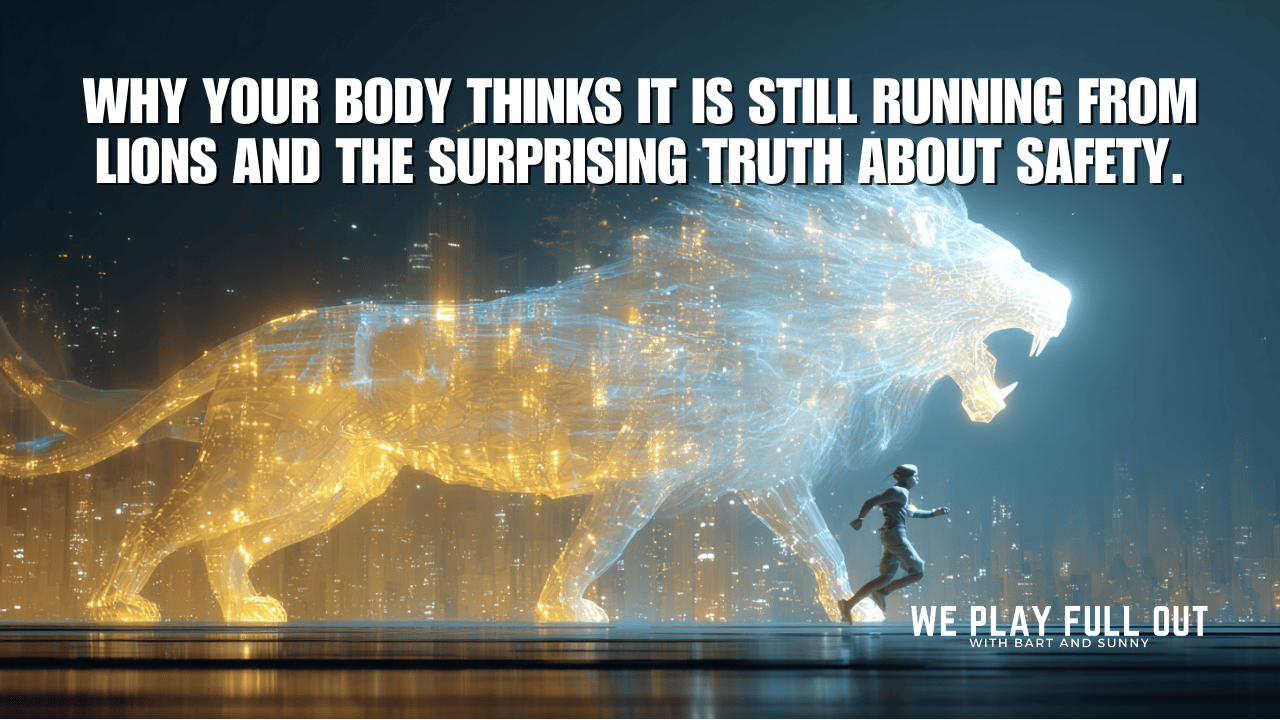Listen to an expanded conversation between Bart and Sunny around this newsletter:
Your Brain is Scanning for Danger (Constantly)
Did you know that five times every second, your brain is constantly scanning and asking one simple question: “Am I safe?”
We are wired this way because this incredible system is what kept our ancestors alive in the wild. It’s why humans didn’t get eaten by lions or wander into danger unprepared. But today, it means our nervous systems are still on constant alert, even when the “threat” isn’t life or death.

You might be thinking, “Okay, but I’m never in a dangerous situation, so my nervous system is fine.” Not so. A “threat” in the modern world can be as simple as an unanswered text, an eye roll or subtle frown from your partner, or a teammate missing a deadline.
Our brains read body language and energy faster than anything else, so even if we aren’t consciously aware of it, our nervous systems are. In other words: you’re not just reacting to the world around you, you’re reacting to the threat your brain thinks it sees.
And this matters. Because once survival mode kicks in, it doesn’t just impact your leadership or your parenting - it affects your business, your intimacy, and the way you show up in every relationship.
So… if actual life and danger isn’t threatening us, why do we feel like these other “small things” are threats?
The 5 Triggers of Survival
Psychologist and neuroscientist Dr. David Rock calls these SCARF triggers. These 5 triggers are the shortcuts your brain uses to decide if you’re safe or under threat.
Status - Am I important here, or am I being diminished?
Certainty - Do I know what’s coming next, or am I in the dark?
Autonomy - Do I have a choice, or am I being controlled?
Relatedness - Am I connected, or left out?
Fairness - Is this just, or am I being taken advantage of?
When one of these gets tripped, your brain does not distinguish between a tiger in the jungle and your spouse forgetting to call. It just screams: “Danger! Protect yourself!”
And the moment that happens, your nervous system switches into survival mode. Stress hormones flood your body. Your heart rate spikes, your muscles tense, your breath becomes shallow, and blood flow pulls away from your gut and your prefrontal cortex. Digestion and rational thought shut down.
Bottom line: you are no longer in connection mode. You’re in self-protection mode.
Different Thresholds for Different People…?
Here’s where it gets even more interesting: not everyone reacts to these triggers in the same way. Each of us has a different threshold in each of the five areas.
Someone with a low threshold for Fairness may explode at the smallest hint of injustice, while another person barely notices.
A partner with a low threshold for Relatedness may panic if they feel excluded, while their spouse with a higher threshold shrugs it off.
A leader with a low threshold for Autonomy feels suffocated by micromanagement, while another might feel cared for.
What sets these thresholds?
Childhood conditioning. Did you grow up with chaos or stability, favoritism or fairness, control or freedom?
Repeated experiences. Past betrayals, abandonments, or power struggles can lower your threshold in a given area.
Personality wiring. Some people are naturally more novelty-seeking (higher threshold for Certainty), others more connection-driven (lower threshold for Relatedness).
This explains why your partner may “seem too sensitive,” or why your teammate may “overreact.” It’s not about being wrong. It’s about different thresholds, in different domains.
Impact on Relationships
The problem is that your body doesn’t know the difference between a lion in the jungle and your partner forgetting to text you back. Both flip the same switch.
And when that happens, here’s what survival mode does to your relationships:
You stop listening because survival mode narrows your focus. You literally can no longer hear nuance. It’s not like you’re not trying, you just can’t do it.
You misinterpret signals. A sigh feels like rejection and silence feels like abandonment. It doesn’t matter what your normal perception is usually like or even what your mind is logically trying to tell you - whatever is true to the body is what becomes true to you.
You escalate…meaning, instead of curiosity your body pushes for defense. You start snapping back, shutting down, or storming out. After the fact we often wonder why we reacted the way we did, but at the time our bodies and emotions were taking charge to get us out of the situation or to win it.
Connection breaks because survival mode makes you view your partner as an opponent to survive, not an ally to connect with.
This shows up in your everyday interactions, but it’s amplified in intimacy. When survival mode takes over in the bedroom (when any of the 5 triggers occur), deep connection and true vulnerability become impossible.
Why Animals Recover and Humans Don’t
Here’s a key insight: animals have the same wiring we do for danger, but they naturally complete the stress cycle.

A zebra chased by a lion will run, breathe hard, and shake until the threat has passed. Within minutes, its body discharges the hormones, resets the nervous system, and goes back to grazing as if nothing happened.
Humans, however, interrupt the completion cycle. We suppress emotion (“don’t cry, don’t make a scene”), we overthink, and we carry the stress long after the moment is gone.
So instead of completing the cycle, survival mode becomes our new daily baseline. Our bodies stay flooded with cortisol and adrenaline. Heart rate, blood pressure, and muscle tension remain elevated. Digestion, immune function, and reproduction downshift because our brain thinks if we are running from a tiger we don’t currently need any of those things.
And because the brain believes we are still unsafe, perception narrows. Our brain is still saying we are in danger, and it is wired to then scan for even more danger. The result is, you become hypervigilant. Neutral cues (a silence, a late reply, a forgotten chore) get misread as threats. Over time, your identity starts to form around this baseline: “I’m anxious. I’m short-tempered. I’m unlovable.”
But really, it’s just that your nervous system just never got the “all clear” message.
The New “Survival Mode” Baseline in Partnership
You can imagine how this new baseline also affects your closest relationships. When survival mode becomes your “normal,” you can’t access curiosity or intimacy because your brain is prioritizing protection, not connection.
Arguments shift from roots to symptoms. Instead of saying, “I feel unsafe not knowing where we stand,” you snap with, “Why didn’t you text me back?” Your partner starts to feel less like an ally and more like an opponent.
And true, deep, amazing intimacy? Forget it. When your nervous system is in survival mode, you literally can’t relax enough to open, connect, or play. Protection always overrides pleasure.
Ready to Reset?
Want to know how to complete the stress cycle so you can get the heck out of survival mode and finally live the way you were meant to?
Simply go to our website, add the course to your cart, and check out now.
Haha - just kidding. 😉
Let’s dive in, because we cannot “stress” (yes, that is a cheesy pun intended) enough how important this is. When you do these things, your body can complete the stress cycle, get out of survival mode, and move on to living your life playing full out!
Completing the Stress Cycle: The Body Reset
The good news? Survival mode doesn’t have to be permanent. The nervous system is plastic, meaning it can learn safety again.
Here’s how to complete the stress cycle in the body:
Shake it out. Literally shake your arms, legs, and torso. Animals do this, we can too.
Deep, intentional breathing. Long exhales (inhale for 4, exhale for 6–8) activate the parasympathetic system.
Move your body. Sprint, dance, push-ups, or walk until you feel release.
Cry, laugh, or shout. Emotional expression is a form of discharge.
Co-regulate. Hug, sync breath, or simply sit with someone safe.
Get this - these actions actually metabolize the stress hormones! Once they’re burned off, the nervous system resets and the body gets the “all clear” it’s been waiting for.
However, when you don’t complete the cycle, the energy doesn’t vanish. Not only are you stuck in fight-or-flight mode in your everyday life, but that energy also gets stored in your body as unresolved trauma. Over time, that unprocessed stress doesn’t just shape your emotional patterns, it also wears down your physical health. Chronic stress and stored trauma are linked to inflammation, digestive problems, immune suppression, sleep disorders, and even cardiovascular disease. The body quite literally keeps the score.
And here’s the part most people miss: that same unresolved energy also blocks what you’re trying to manifest in your life. Why? Because stored trauma acts like static interference. It clouds the signal between your intentions and what you’re calling in.
That’s why body-based modalities like ecstatic dance and breathwork are so powerful. They bypass the thinking mind and allow the body to discharge what it has been holding onto for years. These practices unlock and release stored trauma so your system can reset to safety - and when safety is restored, health, intimacy, and abundance can finally flow.

Safety in the body is the foundation for everything. It’s what allows your desires, visions, and manifestations to finally have space to land.
Beyond the Body: Mind and Life Reset
Completing the stress cycle is the first step. But to keep survival mode from becoming your default, you also need two more layers:
Mind Reset (Reframing). Catch the story your brain is attaching (“They don’t care about me”) and replace it with truth (“I feel uncomfortable, but I’m not unsafe”). Over time, the brain stops tagging every discomfort as danger.
Life Reset (Baseline Safety). Build daily rituals, safe connections, and calming environments that signal to your body: “You are safe.” Every deposit into this “safety bank account” raises your threshold so you don’t get hijacked as easily.
Together, these three layers (Body, Mind, and Life) create a nervous system that isn’t ruled by survival but designed for connection, curiosity, and creativity. We don’t have time here to dive into the other two, but if you want us to talk more about this next week, let us know by hitting reply to this email!
Final Word: You’re Wired for More Than Survival
You’re brilliantly wired for survival. But you were designed for more than just surviving. You were designed to connect. To love. To create. To live fully awake and alive.
And it all begins with teaching your nervous system what it feels like to finally be safe.
That’s what it means to play full out.
Life Updates:
We just got back from Boise and had an amazing time! We stayed at an AirBnb with 8 other people - yes, we were in the “party house” and had lots of laughs and deep conversation. We got to eat some candy from Russia and some incredible food from Persia. New connections were made and we look forward to keeping those going in the future!
Pickleball. We went and hit together one evening just to get some of our stuck energy out, and we also played one game together before we had to get back for some breathwork.
Bart facilitated three breathwork sessions while we were in Boise. It’s so incredible when every participant walks out of a session saying, “That was life changing.” Unless you experience it, it’s hard to describe!
Good to be home… we will be heading to Nashville on September 5th-9th. We look forward to a steamboat cruise with live music and dinner, a jazz club, and of course… Eric Clapton in concert! Xander and Cobe will be joining us and we look forward to spending some amazing time with both of them!
What’d you think of this week’s newsletter? 🤔
Hit reply and let us know! How ya’ feeling? Did we crush it Bomb it? What would you like to hear more about?
Was this forwarded to you? Sign Up Here

